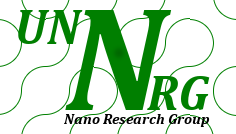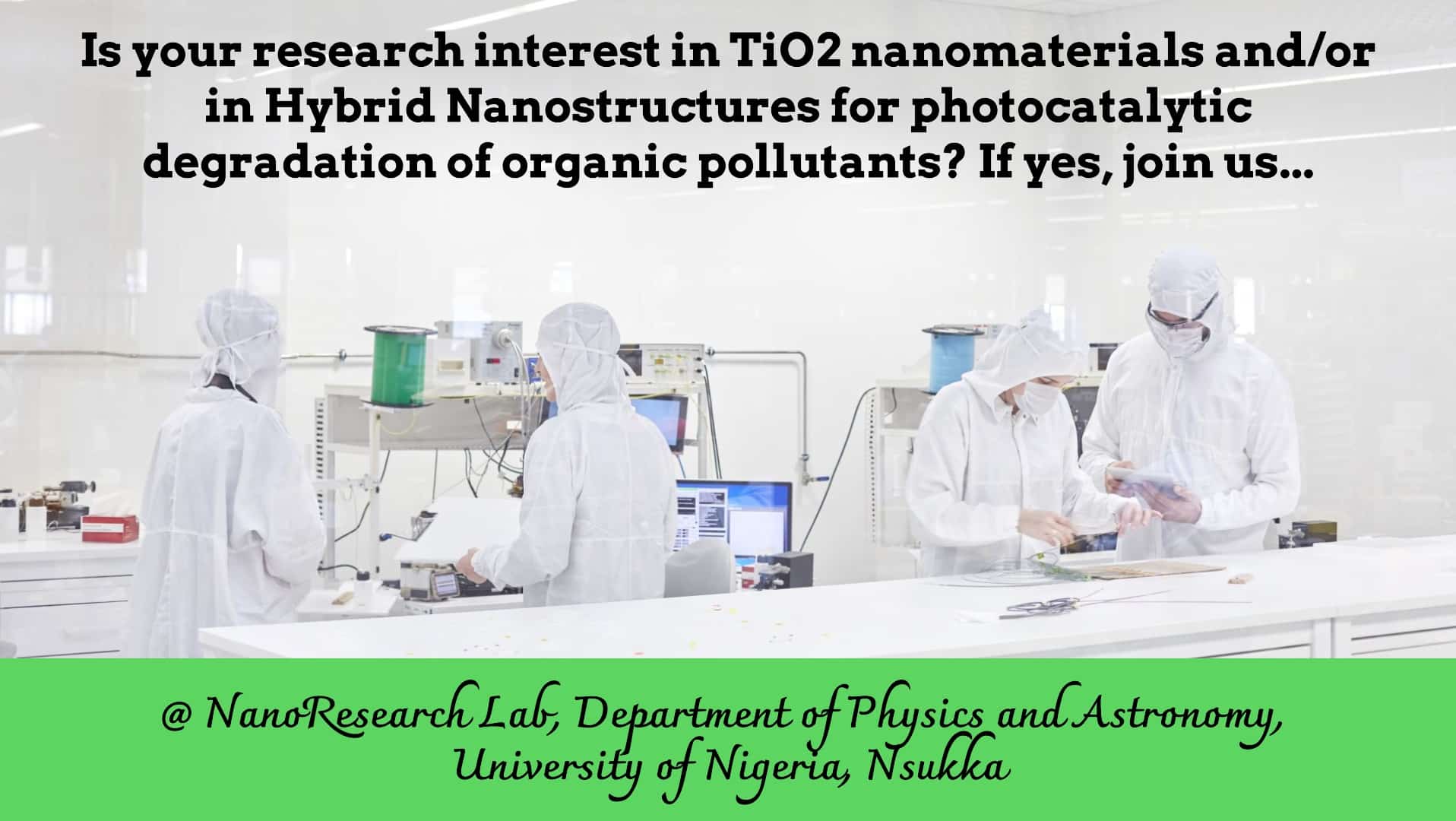Career Opportunities / Openings
Post Doctoral, PhD and MSc Research
Digital Assistant and Content Creator
The Nano-Research Group (Department of Physics and Astronomy, UNN) hereby announces one (1) postdoctoral research position and four (4) postgraduate position openings. The successful candidates are expected to work on the project to advance our knowledge of various TiO2-based photocatalysis. The postgraduate students (2 Ph.D. and 2 MSc.) would conduct research in the different focus areas of the project, ranging from:
- Bio-inspired green process for fabrication of nanomaterials for photocatalysis
- Nanoscale characterization and investigation of charge transfers in photocatalytic nanostructures
- Theoretical and machine learning approach to investigate TiO2-metal electronic structures and
- Photocatalytic activity of TiO2-based nanostructures for degradation of organic pollutants.
POSITION 1 - Ph.D.: Theoretical and Machine Learning approach to investigate TiO2-metal electronic structure (m/f/d)
Overview
Theory and Machine Learning. Model the electronic structure of the TiO2–metal NPs using the Density Functional Theory (DFT) approach to understand the TiO2-metal electronic structure.Your Profile:
- A completed university degree (Masters) in the field of Physics, Materials Science or Engineering, Computer Science, Data Analytics, or a related course of study.
- Must have relevant skills in theoretical modeling using the Density Functional Theory (DFT) approach to model the electronic structure of materials, VESTA, and Monte Carlo simulation, among others.
- Solid skill in programming especially Python and other machine learning (ML) & neural network frameworks (PyTorch, TensorFlow, etc. for model training, validation & deployment).
- The ability to link a DFT model (data) and a Neural Network model is highly advantageous.
Task:
- Theoretical modeling of the relationship between structural connectivity of metallic nanoparticles and TiO2 nanorods using Density Functional Theory (DFT).
- Optimize the shape (and size) of the nanorods (and metallic nanoparticles), with the possibility of obtaining TiO2-based materials that are structurally robust for efficient charge transfer within the nanocomposite, and at the same time, capable of high photo-response in the visible spectral region for utilization as photocatalyst under natural/sunlight irradiation.
- Provide insights into the physics (theory) underlying charge transfer in hybrid nanostructures.
- Extract relevant data from both the DFT calculations and experiments for training an ML model that predicts the photodegradation rates of the DFT-optimized photocatalysts on selected water pollutants.
- Validate the model and evaluate the performance using relevant statistical performance metrics such as coefficient of determination (R2), mean absolute error (MAE), and root-mean-square error (RMSE), among others.
POSITION 2 - Ph.D.: Nanoscale characterization and investigation of plasmonic charge transfer in photocatalytic nanostructures (m/f/d)
Overview
The research in this area is focused on the development and advanced characterization of visible-light-driven photocatalytic nanomaterials.Your Profile:
- A completed university degree (Masters) in the field of Physics, Materials Science, Engineering, or a related course of study.
- Must have relevant skills in instrument development and characterization on microscopy and spectroscopy. A good knowledge of the application of AFM in nanoscale electrical characterization and KPFM is an added advantage.
Task:
- Hydrothermal wet-chemical method to synthesize TiO2 nanorods and TiO2-metal doped nanomaterials.
- The modification of the nanostructures to achieve enhanced carrier separation, and engineered bandgap to realize visible-light-driven photocatalytic activity of TiO2-based nanomaterials.
- Evaluate the effect of the various fabrication variables (e.g., various leaf extracts, metallic NP composition/size/structure/etc.) on the properties of the materials using a suite of characterization techniques.
- In-depth analysis of the measurements and response patterns obtained from the nanostructures.
- Identify the ideal conditions for optimizing the properties of the nanostructures and relevant potential nanomaterials.
- Develop a suitable model for an explanation of the material properties and description of the NPs-TiO2 nanostructures.
POSITION 3 - M.Sc.: Bio-inspired green process for fabrication of nanomaterials for photocatalysis (m/f/d)
Overview
The research focus area will target a low-cost, environmentally friendly synthesis of nanomaterials for photocatalytic degradation of organic pollutants from real samples of oil spillage wastes.Your Profile:
- The ideal candidate must have a good knowledge of Materials Chemistry.
- Must have completed an undergraduate program in the relevant field (for example, Physical and Materials Chemistry).
Task:
- Develop a protocol for plant pigment extraction.
- Characterization of the extract to identify various secondary metabolites.
- Perform a comparative study on the capping/reducing/stabilizing ability of the extract from different plants.
- Evaluate the effect of the various plant pigments on the synthesis and properties of the proposed nanomaterials using a suite of characterization techniques.
POSITION 4 – M.Sc.: Photocatalytic activity of TiO2-based nanostructures for degradation of organic pollutants (m/f/d)
Overview
Comparative study of the photocatalytic activity of different metal-doped or metal-based TiO2 composite on the degradation of organic pollutants.Your Profile:
- A completed university degree in the field of Physics, Materials Science, Engineering, or a related course of study.
Task:
- Treat organic pollutants up to the quantity of standard allocated by EPA and WHO for wastewater from oil refineries.
- Determine the kinetic and thermodynamic properties of the degradation of the pollutant from the wastewater.
- Determine optimal conditions for degradation of organic pollutants (photocatalyst Dose, reaction time, reaction pH, and reaction temperatures.
POSITION 5 – Postdoctoral Fellow (m/f/d)
We seek a highly motivated scientist with a suite of skills (Theory and Experimental) who is interested in advanced fabrication and fundamental studies of TiO2 photocatalysts and related nanomaterials. The ideal candidate must have completed a Ph.D. program in Physics, Materials Science, Chemistry, or related fields.Educational Qualification/Experience:
- Ph.D. (obtained within the last 5 years) in the field of Physics, Materials Science, Engineering, Chemistry, or a related discipline.
Responsibilities:
The successful candidate must be highly motivated with a record of productive research, and eager to work in a collaborative research environment. The individual is expected to design and run experiments, troubleshoot new protocols and imaging methods, mentor postgraduate students, and manage research projects. The individual will be encouraged to participate in department seminars, conferences, and training to further develop their career.General Requirement:
- Excellent interpersonal and communication skills (written and verbal).
- High degree of independence and willingness to make a great deal of commitment.
- Very reliable and conscientious working style
- Good scientific principles
Instructions for Submitting Applications
Interested applicants should submit a one-page personal statement (highlighting your scientific contributions, long-term goals, and interest in research), and a detailed CV (as a single MS Word or PDF document) to nanoresearch@unn.edu.ng. All interested applicants must provide 3 letters of recommendation sent directly to the above email address by a professor or other reference. Applications will be reviewed on a rolling basis and successful candidates will be contacted directly via email.Equal Employment Opportunity Statement
All qualified applicants will be considered regardless of race, color, creed, religion, gender, nationality, origin, sex, marital status, genetic information, age, or disability.Salary
Attractive salary structure and comparable with what is obtained in other standard organizations/institutions in Nigeria.Position Overview:
Are you a creative and social media-savvy individual with a passion for staying on top of the latest trends? Are you passionate about digital content? If so, we want you to join our vibrant and forward-thinking team at Nano Research Lab. As a Digital Assistant and content Creator, you'll be an integral part of our mission to redefine the digital presence of our lab and research activities. We're seeking a detail-oriented, self-sufficient, and motivated team member who excels in communication, thrives on creativity, and has excellent time management skills for effective multitasking.- As our go-to guru for all things social media, you'll need to have top-notch video and photo editing skills, a knack for photography and videography, and a talent for scouting out the latest breaking news in research, both locally within our university, across the nation and beyond.
- In this role, you'll be responsible for creating captivating content for a range of platforms, including Instagram, Facebook, LinkedIn, Email campaigns, YouTube, and our website. You'll need to have a keen understanding of what makes great content and be able to film our cutting-edge research activities and other laboratory processes, work with our esteemed researchers, photograph our latest equipment, and more.
- Create compelling blog posts, social media posts, content library, videos, and other types of content.
- The successful candidate will have a passion for writing and be able to create content that is engaging, and informative. The ideal candidate should have an eye for detail and be able to work quickly and efficiently.
Perks:
- Competitive pay.
- Flexible work schedule.
- Part of a passionate and creative team.
- Many growth and learning opportunities.
Qualifications:
- A talent for photography and videography.
- Excellent video and photo editing skills.
- Active social media accounts demonstrating your talent/portfolio of your work.
- Ability to film in-situ research activities and processes and photograph new equipment.
- Creativity and a passion for staying up to date with the latest social media trends.
Responsibilities:
- Manage and measure social media platforms for engagement.
- Develop content that is engaging and informative.
- Edit and proofread content for accuracy and clarity.
- Ensure content is optimized for search engine visibility.
- Stay up to date on research and industry trends.
- Develop and maintain an organized and accessible content library that contains all our digital assets, including images, videos, audio files, and other content types.
- Collaborate with other team members to create engaging content.
- Plan and create video content that aligns with our research goals.
- Conduct on-camera interviews and create video content that highlights our members’ research activities and other engagement.

